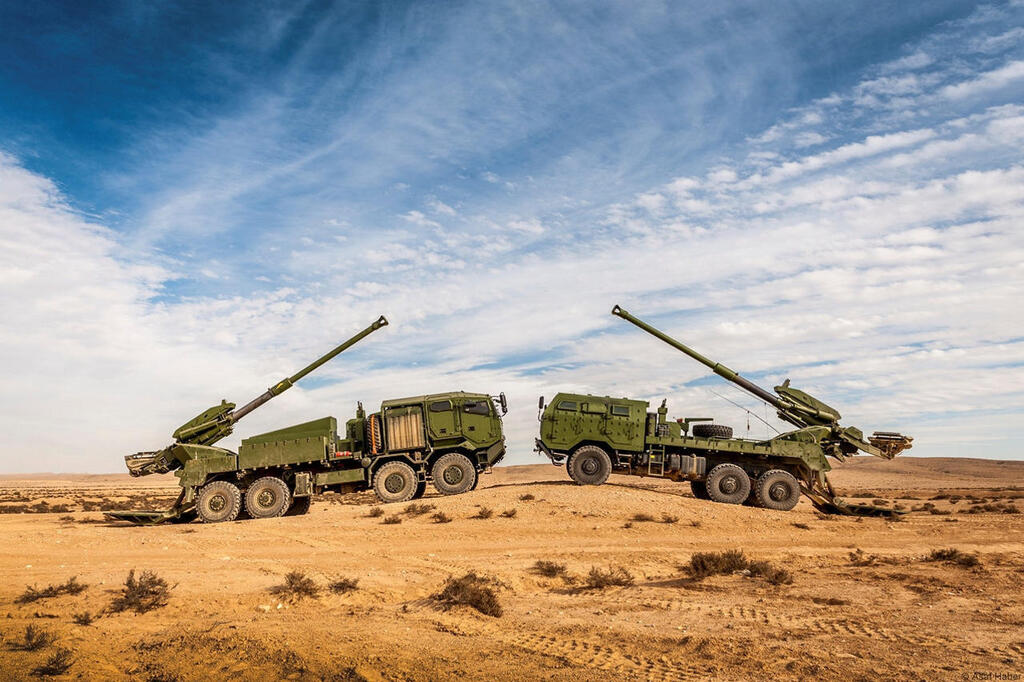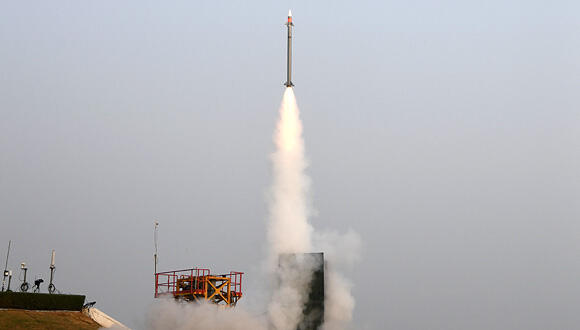
Analysis
Rising demand for weapons bolsters Israeli defense companies' sales to all-time highs
Data for the second quarter of 2023 reveals the growth of the defense industries, which are thriving globally while high-tech continues to take hits
The reports for the second quarter of the arms manufacturers Rafael, Israel Aerospace Industries and Elbit Systems, published recently, continue to point to a trend of strong demand for weapons in the world, in a way that benefits the defense companies and brings them to an all-time high in sales. In addition to that, their order backlog has been increasing and expanding since the outbreak of the war in Ukraine.
The defense companies are thriving while the global high-tech industry is reeling, particularly in Israel due to the judicial reform. At least on one front the defense industries are benefiting from the crisis in high-tech: they all of the sudden have the upper hand in the battle for the best talents as the task of recruiting new employees has become easier.
There are also effects on the political level. Just less than a month ago, Prime Minister Binyamin Netanyahu and Finance Minister Bezalel Smotrich used the defense industry's improved results in their response to Moody's rating agency's warnings about the consequences of the judicial reform on Israel's economy. They opened their response saying that defense industries were "exploding with orders", as if this abundance was related to moves they themselves led and not to the whims of Russian President Vladimir Putin, who decided to go to war in Ukraine and plunge the world into an unprecedented arms race.
As for the results themselves, at the beginning of the week, Rafael published its results for the second quarter of 2023, and its sales jumped by about 30% compared to the corresponding quarter last year, and amounted to NIS 3.14 billion (approximately $826 million). The orders that flowed to it from the defense establishment and procurement bodies around the world in the first half of the year swelled its order backlog by NIS 10.6 billion ($2.79 billion), and it totaled a record NIS 41 billion ($10.8 billion). Its net profit in the second quarter amounted to 111 million shekels ($29.1 million) compared to a loss of 159 million shekels ($41.8 million) in the corresponding quarter of 2022, due to a special tax on retained profits from previous years amounting to some $128 million.
Israel Aerospace Industries (IAI), which like Rafael is also government-owned, reported a 9% increase in its sales in the second quarter, which amounted to $1.26 billion (NIS 4.8 billion) and a backlog of $16.4 billion (NIS 62.4 billion), approximately 75% of which are intended for export. Its net profit amounted to about $74 million (NIS 280 million) after jumping by no less than 45% compared to the net profit it presented in the corresponding quarter.
The public Elbit Systems, controlled by Mikey Federman, presented an 11.5% increase in revenues compared to the corresponding quarter, which amounted to $1.45 billion (5.5 billion NIS) and an increase in the order backlog which amounted to $16.1 billion (about NIS 61 billion). However, its net profit fell by 23% compared to the corresponding quarter and amounted to only $62 million (about NIS 236 million) against the background of an increase in financing expenses.
As mentioned, most of the increase in sales of the defense industries in the last year, as well as in 2022, can be attributed to the effect of the Russia-Ukraine war, which has been going on for about a year and a half and whose end is not in sight. The analysis of the war is accelerating a global arms race, especially in Europe, while in the background many armies are adjusting their responses to new threats, such as suicide drones and precision missiles. In addition, armies that are providing extensive military aid to Ukraine are also conducting extensive defense procurement, designed to refill the depleted ammunition warehouses with new and more advanced means, some of which they purchase from Israeli companies, with an emphasis on air defense systems.
And yet, without the Russia-Ukraine war, it is possible that only the Israelis would have benefited from the Israeli air defense systems. Germany, for example, was already interested about six years ago in the purchase of the IAI's Arrow 3 defense missile system. At the time, Israel did not promote negotiations with Germany on the assumption that the Americans would not approve the deal anyway. The same is true of Rafael, which about a decade ago came close to a huge deal with Poland, centered on the groundbreaking defense system, David’s Sling, which was also developed with generous financial assistance from the United States, which on its side vetoed it. Instead of advanced Rafael missiles, the United States actually promoted the sale of American-made Patriot missiles to Poland, as part of a multi-billion dollar deal.
The war in Ukraine and the West's intention to exhaust Putin in a long war, in the hope that his position would eventually be undermined, changed the rules of the game for the U.S. Now the Americans practice a relatively permissive attitude towards Israeli industries when it comes to selling defense systems to Europe. It is expressed in the approval that the State Department gave to the IAI about two weeks ago to export to Germany Arrow 3 missiles in a deal valued at NIS 14 billion ($3.5 billion), and with another approval given to Rafael to export, also for the first time, the David’s Sling system to Finland for NIS 1.1 billion.
Sources in the defense industries believe that these deals will whet the appetite of more countries for Israeli defense systems. Calcalist has learned that these days negotiations are taking place between representatives of IAI and a country in Asia regarding Arrow 3. Even if these contacts ripen, they will not become a deal without American approval.
The surge in demand for Israeli missiles is resulting in "good problems" for Israeli industries. Along with meeting the delivery rates of the Arrow and David’s Sling missiles for use by Israel's air defense system, IAI and Rafael will also have to produce them in large quantities for Germany and Finland, and they have begun plans to expand the production lines.
Calcalist has learned that the IAI is considering bringing in contract workers, who will be employed in the production of the missiles and their associated systems, as well as in the production of the radars used by the Arrow 3 system, by its subsidiary company, Elta Systems. This, with the understanding that the sharp increase in the volume of work is likely temporary. The production lines operated by government company Tomer, which develops and manufactures the engines of the Arrow 3 and the engines of Elbit Systems' multi-purpose precision rockets, whose range is up to 300 km, will also be expanded soon.
At the beginning of the year, Elbit signed a deal with the Ministry of Defense of Denmark for about $260 million for the sale of rockets with varying ranges, suitable launch systems and new ATMOS type cannons, which will replace the older cannons used by the Danes and transferred by them to the Ukrainian army. This deal made headlines in Denmark in recent days when the Danish Minister of Defense fired the Secretary of State after failings were revealed in his conduct surrounding the promotion of the procurement of missiles and cannons.
Israeli industries also operate in other conflict areas in the world. The ongoing tensions in the South China Sea are boosting the demand for naval combat systems, such as sonar-based systems used to detect and identify submarines, systems for exposing and neutralizing naval mines and unmanned vessels. Elbit, which in recent years has invested in developing its product portfolio for the maritime arena, sees it as a significant growth potential for the coming years.
The Abraham Accords also have a positive effect on the arms industry and in 2022, Arab countries accounted for a quarter of Israel's defense exports when they purchased weapons from it for approximately $3 billion. The most notable deals were made in the United Arab Emirates, which purchased Barak 8 missiles from the Israel Defense Forces to protect some of its strategic facilities against a possible Iranian attack, and in Morocco, which is rapidly equipping itself with Israeli weapons, including Barak 8 missiles, for an amount estimated at half a billion dollars.
The warming security relations with Morocco, which, apart from defense missiles, include the procurement of additional systems, have largely flown under the radar. According to recent reports in Morocco, Elbit Systems will establish two factories in the Casablanca area that will manufacture components for drones and roving munitions. Elbit refuses to comment on these reports. IAI also offers its expertise in the field of roving munitions to Morocco, as part of its ongoing struggle against the Polisario front in the Western Sahara. In recent months, the Israeli government has recognized Morocco's sovereignty over this region, in a way that expresses the warming of relations between the two countries.















